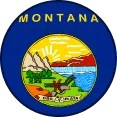Introduction to employment laws in Montana
Overview
In addition to federal law, Montana follows regulations that provide protection to employees in various areas such as maternity leave and wrongful termination. This unique set of employment laws and regulations is something that hiring managers must be aware of.
The state also has specific requirements around drug testing, wage and hour laws, and discrimination protections that go beyond federal standards. In this guide, we’ll cover everything that businesses hiring in Montana need to know.
Employing in Montana: Key employment laws and practices
Standard work hours
In Montana, full-time employment is typically considered to be between 30 and 40 hours per week. However, the exact number may vary depending on the industry or employer policies.
Contractual employees’ work hours can differ widely based on the terms of their specific contracts. Employers should clearly define work-hour expectations in these agreements.
For self-employed professionals or freelancers, work hours largely depend on the terms of their contracts with their clients.
Minimum wage and overtime
Employment laws in Montana establish that non-exempt employees should be paid a minimum wage of $10.30 per hour, which is higher than the federal minimum of $7.25 per hour. Employers must stay updated with any annual adjustments based on inflation statistics, ensuring they comply with the highest minimum wage, be it federal or state-specific.
The Montana Department of Labor and Industry has regulations in place for overtime compensation. Non-exempt employees must receive overtime pay equivalent to one-and-one-half times their regular hourly wage for every hour worked over 40 in a workweek.
Insurance and benefits
Montana law requires employers to offer workers’ compensation insurance to their employees. This insurance covers medical expenses and lost wages if an employee gets injured or falls ill due to work-related causes.
In addition, full-time employees are often eligible for benefits such as health, dental, and vision insurance, retirement benefits, and 401k plans. However, the exact benefits package can vary significantly among employers.
Employers should also comply with federal regulations like the Affordable Care Act (ACA) mandates on health insurance coverage.
Meal and rest periods
Montana has no laws governing breaks and meal periods for employees, regardless of age. If an employer chooses to provide breaks, those that last less than 20 minutes should be paid, according to guidelines found in the Federal Labor Standards Act (FLSA). Also in accordance with the FLSA, should a meal break of a half hour or longer fully fully relieve the employee of work duties, it is not compensable time.
Multiplier makes it easy to manage benefits for Montana employees.
Anti-discrimination laws
In Montana, HR compliance necessitates strict adherence to anti-discrimination laws. The Montana Human Rights Act (MHRA) prohibits employers from discriminating against employees based on race, color, national origin, age, physical or mental disability, sex, and creed. This act extends further protections than federal law by including protections for individuals based on their marital status.
Harassment is viewed as a form of illegal discrimination when it is based on a protected characteristic under the MHRA. Retaliation against employees for opposing discrimination, filing a complaint, or participating in an investigation is also prohibited.
Employers should note that the MHRA also makes it illegal to discriminate in employment matters based on marital status.
Disciplinary actions or negative job consequences as a result of such activities would be considered retaliation. Employers must ensure that their policies and procedures align with these regulations to maintain a fair and inclusive workplace.
Leave policies
Montana’s leave policies extend beyond federal guidelines, offering additional protections for certain workers. The state provides maternity leave for female employees who have worked for the same employer for at least a continuous year prior to giving birth.
As per the Montana Maternity Leave Act (MMLA), eligible employees are entitled to take up to six weeks of unpaid leave.
Victims of crime are also protected under Montana’s Crime Victim Leave law, which allows employees to take reasonable time off to attend court proceedings. Employees who serve in the military or public office are also entitled to specific leave provisions under state law.
Leave type | Description |
Maternity leave | Unpaid leave up to six weeks, in addition to protections provided under the Federal Family Leave Act (FMLA) |
Crime victim leave | Reasonable time off to attend court proceedings |
Military leave | As per federal USERRA regulations, with additional stipulations under MMSERA |
Jury duty leave | Reasonable time off for public office duties |
Termination laws
Understanding Montana’s termination laws is crucial to maintaining HR compliance. Unlike many states that follow the “at-will” employment rule, Montana has a Wrongful Discharge From Employment Act (WDEA), which offers greater protection for employees who have completed their initial probationary period.
Under the WDEA, good cause, defined as legitimate business reasons or poor performance by the employee unrelated to the employer’s failure to train or supervise, is required for termination. The law also protects employees from retaliation for refusing to violate public policy or whistleblowing.
Easily onboard employees in Montana?
Safety and health
Montana employers must adhere to specific safety and health regulations. The Montana Safety Culture Act mandates that all employers develop a comprehensive safety training program for employees and establish a safety committee for those with more than five employees.
In terms of promoting a healthy working environment, the Montana Clean Indoor Air Act prohibits smoking in enclosed public places, including workplaces. Employers are required to place conspicuous notices about this prohibition at public entrances.
Montana is the one remaining state in the United States not yet to have enacted any distracted driving laws.
Taxes in Montana
Both employers and employees have tax obligations under Montana employment laws. Employers must withhold federal income tax from their employees’ wages while also contributing their portion of Federal Insurance Contribution Act (FICA) taxes, which include Social Security and Medicare taxes.
There is also a state income tax.
Unemployment taxes are levied on employers. The tax rate varies depending on the employer’s experience rating and the state’s unemployment rate. Employers are also responsible for withholding employee contributions for State Disability Insurance (SDI) if applicable.
Tax type | Description |
Federal income tax | Withheld from employee wages |
State income tax | 4.7% on wages up to $20,500, 5.9% on wages above this |
FICA taxes | Includes Social Security and Medicare taxes, shared by employer and employee |
State unemployment tax | Rates vary, paid by the employer |
Managing Montana employees with an Employer of Record (EOR)
Taking on the complexities of employment laws and HR compliance in Montana can be a daunting task.
However, with Multiplier’s all-inclusive Employer of Record (EOR) solution, businesses can employ full-time workers in all U.S. states, including Montana, without the need for local entities. Moreover, we handle local taxes, contributions, and withholdings via our Global Payroll platform, which pays international employees and contractors in over 120 currencies.
Need help with benefits administration? We’ve got you covered with U.S-compliant, competitive benefits offerings, including insurance coverage and pension plans. If you’re considering extending stock ownership plans to your global team, our ESOP administration service is just what you need.
At Multiplier, we are committed to simplifying the process of hiring, onboarding, paying, and managing international employees and contractors. Book a demo today.
FAQs
Montana employment laws cover various aspects of the employer-employee relationship. Under the Montana Human Rights Act (MHRA), discrimination on grounds such as race, religion, age, and sex is prohibited. Equal pay is mandated under state law, with employers required to pay women as much as men for equivalent services or work. Whistleblower protections are enforced under the Wrongful Discharge From Employment Act (WDEA), protecting employees from being terminated for reporting violations of public policy.
In Montana, employers can carry out pre-employment credit checks, provided they have obtained the applicant’s written authorization. If an adverse employment decision is made based on a report, the employer must inform the applicant and provide a copy of the report. An array of Montana laws regulate drug testing in the workplace.
Montana employment laws specify that the state’s minimum wage for nonexempt employees is $10.30 per hour. Any employer with gross sales receipts of less than $110,000 per year not covered by the federal Fair Labor Standards Act may pay a lower wage. Overtime compensation at a rate of one-and-one-half times their regular hourly rate is due for all hours worked over 40 in a workweek.
Employers in Montana must establish scheduled paydays in advance and provide employees with an itemized pay statement when wages are paid. Wages can be paid in cash, by check, direct deposit, or electronic paycard under certain conditions.
Montana has several laws relating to time off and leaves of absence for employees. These include maternity leave, crime victim leave, military leave, and jury duty leave. As with other aspects of employment law, where there is overlap between federal, state and local law, compliance with the law that offers the greatest rights or benefits to the employee generally applies.


